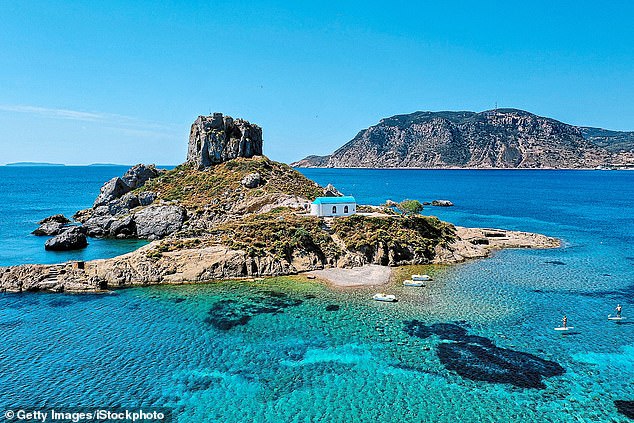Theodosis Diakoyannis is 84 years old and smokes two cigarettes a day “for health reasons.”
“I have no doubt that if Hippocrates were alive he would have found beneficial uses for tobacco,” he says of the ancient physician, about whom he has written five books.
I am at the International Hippocratic Foundation on the island of Kos in the Dodecanese, and Mr Diakoyannis, the director of the foundation, has been showing me its treasures. Of the 257 known medicinal plants used by Hippocrates (tobacco is not among them), 247 have been planted in the medicinal plant garden and 200 are in apothecary jars in the pharmacy.
“Hippocrates used mandrake venom as a painkiller, in addition to opium,” he explains. “And he produced an ancient form of Voltarol (anti-inflammatory), using pork fat mixed with hot peppers.”
In other rooms, Hippocrates’ instruments are displayed: a stretcher shaped like a frame for stretching the spine and surgical instruments used for mastectomies and trepanations. The instruments are displayed alongside their modern equivalents, identical except that the latter are made of stainless steel.
Seaside beauty: On a trip to Kos, Teresa Levonian Cole visits Agios Stefanos beach, which overlooks the island of Kastri and its small chapel of St Nicholas with its blue dome (pictured)
I spent a fascinating two hours here, made all the more astonishing by the fact that Hippocrates, Kos’ most famous son, was born around 460 BC. It is the island’s biggest attraction, and tourists flock to see the 400-year-old plane tree, its spreading branches supported on crutches, which legend has it was planted by Hippocrates himself (never mind the impossible).
It lies behind the huge castle of the Knights Hospitaller, next to the ancient port of Mandraki, a pretty area where a mix of architecture from successive rulers coexists: from the classical (a huge partially excavated agora) to the medieval castle, the Ottoman mosque and the palace of justice built by the Italians, who occupied the island until 1944. Among the proliferation of new cafes, restaurants and shops, these serve as a reminder of the good times of Kos.
“In the 5th century BC, there were 180,000 inhabitants on Kos; today there are only 40,000 left,” says my guide, Iannis, as we visit the Asclepius, founded by Hippocrates around 366 BC. “The island was an important centre, which grew rich thanks to its position on the Gulf of Ceramika, a strategic trade route.”
The three imposing levels of the Asklepion – part hospital, part temple of the god of healing – are dedicated to the healing of body, soul and spirit. We climbed the steep stone steps to the top, where dream interpretation took place, and looked out over the water towards Turkey.
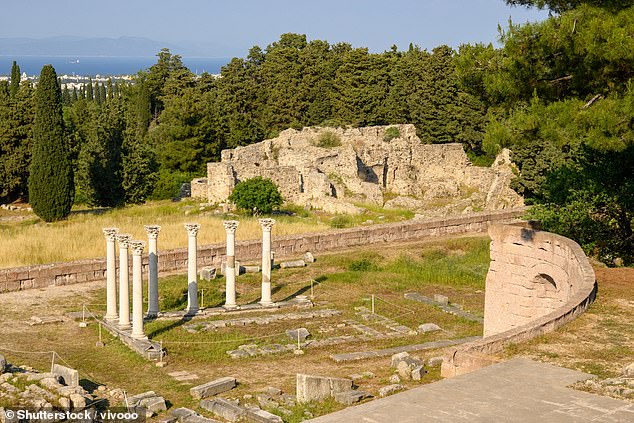
Teresa explores the ruins of the Asklepion (seen here), an ancient healing temple.
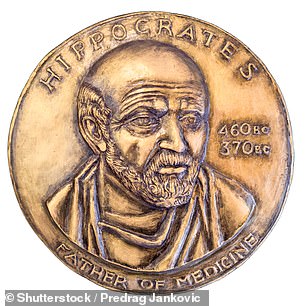
A bronze medallion depicting Hippocrates, the father of medicine, who was born in Kos.
I visit Neratzia, the Knights’ castle, covered with the coats of arms of the Grand Masters; I bathe in the steaming hot springs of Agios Fokas (a Hippocratic remedy for psoriasis), I walk along the beautiful crescent-shaped beach of Kephalos (ancient Astypalea, where Hippocrates was born) and I persuade my taxi driver, Michalis, to take me to the beach of Agios Stefanos, which overlooks the island of Kastri and its little blue-domed chapel of St Nicholas.
Next, I head to ancient Pyli, where, sitting on the rocks, I meet a bright-eyed ancient sailor who regales me with fantastic tales of pirates and princesses in the castle high above.
Part of an ancient settlement, with a monastery founded in the 11th century by St. Christopher, of which today only ruins remain, and the small church of the Taxiarchon, bathed in the sound of goat bells and birdsong. It is the most magical place on the island. And I could have listened to the old man for hours.
I also dine on fresh grilled fish in local tavernas and sophisticated restaurants such as H2O or the delicious Votsalakia, which stretches down to the beach, with wines from local vineyards and delicious artisanal olive oil. Kos is a town that stands out for its good food.
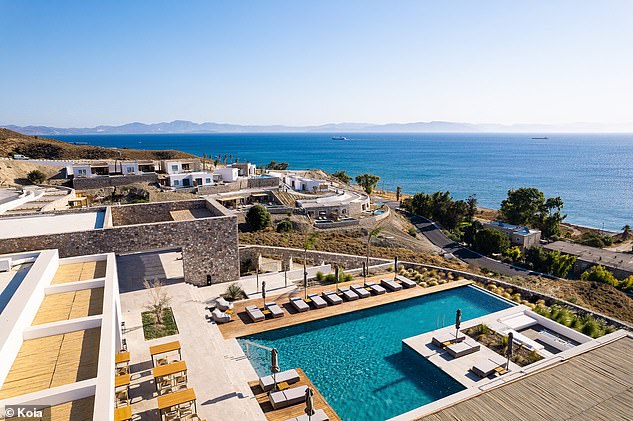
Teresa checks into Koia (above), a new adults-only, family-friendly boutique hotel “inspired by the Hippocratic principles of living and wellness”
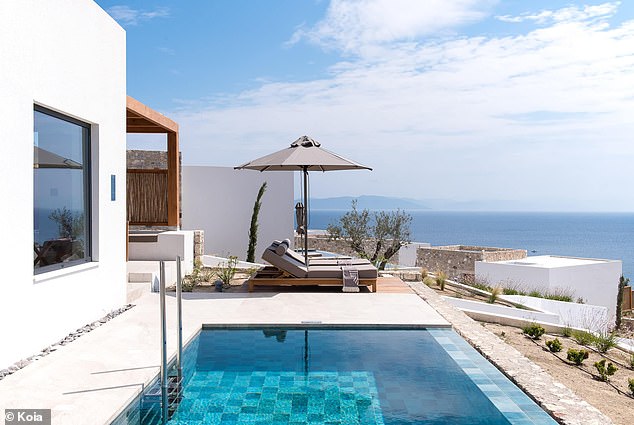
Rooms at Koia have spacious terraces, most with their own plunge pool, like the one pictured here.
Otherwise, the island is an example of the dangers of mass tourism, with a proliferation of charmless hotels, crowded beaches and busloads of people invading the once charming mountain village of Zia in search of sunset views and identical tourist attractions.
Enter Koia, a new, family-run, adults-only boutique hotel “inspired by the Hippocratic principles of living and wellness” that raises the bar several notches.
Camouflaged into a hillside, with warm, minimalist stonework, it is a wonderful retreat. The 50 rooms have spacious terraces (most with their own plunge pool) and huge windows facing the sea that offer glorious sunrise views. Add to that its own beach and a creative, award-winning chef, and you have a hotel that promises to raise the bar on the island.
My only regret is not having discovered it sooner, but, sipping a tequila cocktail with herbs from the garden, I think that is reason enough to return.


